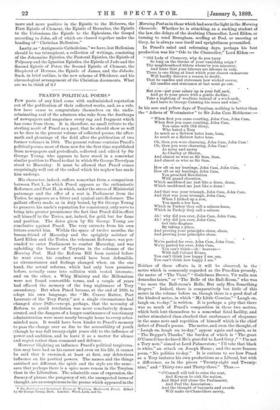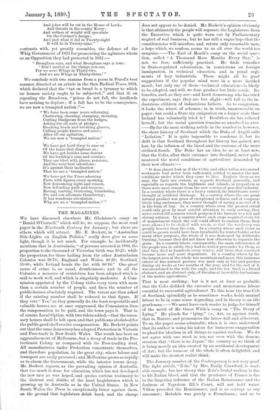PRAED'S POLITICAL POEMS.* FEW poets of any kind come with
undiminished reputation out of the publication of their collected works, and, as a rule, few have cause to congratulate themselves on the undis- criminating zeal of the admirers who rake from the dustheaps of newspapers and magazines every rag and fragment which has come from them. It is, therefore, no small tribute to the sterling merit of Praed as a poet, that he should show so well as he does in the present volume of collected poems, the after- math and gleanings of the field after the publication of two former volumes in 1864. The present volume contains Praed's political poems, most of them now for the first time republished from newspapers and periodicals, collected and edited by Sir George Young, who appears to have stood in a somewhat similar position to Praed to that in which Sir George Trevelyan stood to Macaulay. It must be allowed that Praed comes surprisingly well out of the ordeal which his nephew has made him undergo.
His character, indeed, suffers somewhat from a comparison between Part I., in which Praed appears as the enthusiastic Reformer, and Part IL, in which, under the stress of Ministerial patronage and the offer of a seat in Parliament from the Tories, he appears as a bitter and cynical anti-Reformer. The gallant efforts made, as in duty bound, by Sir George Young to preserve his uncle's reputation for consistency, only serve to bring into greater prominence the fact that Praed did in effect sell himself to the Tories, not, indeed, for gold, but for fame and position. The dates given by Sir George Young are conclusive against Praed. The very extracts from his own letters convict him. Within the space of twelve months, the bosom-friend of Macaulay and the sprightly satiriser of Lord Eldon and the Tories, the vehement Reformer, was per- suaded to enter Parliament to combat Macaulay, and was upholding the banner of Toryism in the columns of the Morning Post. Had the Reform Bill been carried before he went over, his conduct would have been defensible, as circumstances and feelings changed when, on the one hand, the actual reforms, which had only been promises before, actually came into collision with vested interests ; and on the other, a Whig Ministry and the Millennium were not found convertible terms, and a couple of years had effaced the memory of the long nightmare of Tory ascendency. But when Praed became, at the end of 1830, to adopt his own language, the "Mr. Crazee Ratter, Poet Laureate of the Tory Party," not a single circumstance had changed since 1829,—except, perhaps, that the necessity of Reform to avoid revolution was more conclusively demon- strated, and the dangers of a longer continuance of reactionary administration were more nearly brought home to every sober- minded man. It would have been kinder to Praed's memory to pass the change over as due to the accessibility of youth though he was full twenty-eight years old) to the influence of power and ambition, and to leave it as a matter for silence and regret rather than comment and defence.
However blighting an influence Praed's political tergiversa- tion may have had on his career and even on his life, it cannot be said that it exercised, at least at first, any deleterious influence on his poetical powers. The names and the things satirised are different, the spirit and the style are the same : save that perhaps there is a spice more venom in the Toryism than in the Liberalism. The admirable ease of expression, the fluency of phrase, the pungency of wit, the unexpected turns of thought, are as conspicuous in the poems which appeared in the • The Political and Occasional Poems of Winthrop Macicuorth Praed. Edited by Sir George Young, Bart. London : Ward, Look, and Co. Morning Post as in those which had seen the light in the Morning Chronicle. Whether he is attacking, as a sucking student of the law, the delays of the doubting Chancellor, Lord Eldon, or turning to rend Brougham, scoffing at Peel, or sneering at Grey, he is always ease itself and sprightliness personified.
In Praed's salad and reforming days, perhaps his best production was his "Ode to the Chancellor," Lord Eldon
Old Lady of Chancery, why do you tarry
So long on the throne of your vanishing reign ?
The neighbourhood titters whene'er you miscarry, And hints that your labours are labours in vain.
There is one thing at least which your closest endeavour Will hardly discover a reason to doubt, That be candles and statesmen how wicked soever, . All candles and statesmen at last must go out. ....... . . But you—put your salary up in your full sack, And go to your grave with a gentle decline;
Take a nightcap of woollens instead of a wool-sack, And leave to George Canning his roses and wine."
In his sere and yellow days of Toryism, nothing is better than the "Adieus of Westminster" to Sir John Cam Hobhouse :— " When first you came courting, John Cam, John Cam,
When first you came courting, John Cam, You came with Old Glory, Who hated a Tory As much as a Hebrew hates ham, ham, As much as a Hebrew hates ham.
Oh, then you were charming, John Cam, John Cam ! Oh, then you were charming, John Cam !
As noisy and merry As Charley or Sherry, And almost as wise as Sir Sam, Sam, And almost as wise as Sir Sam.
How oft on my hustings, John Cam, John Cam, How oft on my hustings, John Cam, You preached Revolution With grand elocution, Which maddened me just like a dram, dram, Which maddened me just like a dram !
And that was your triumph, John Cam, John Cam, And that was your triumph, John Cam, When I kicked up a row, You made a low bow, Which in Turkey they call a salaam-laam, Which in Turkey they call a salaam.
Ah ! why did you ever, John Cam, John Cam, Ah ! why did you ever, John Cam, Get into disgrace By taking a place, And proving your principles sham, sham, And proving your principles sham.
. . . ..... . .
We're parted for ever, John Cam, John Cam, We're parted for ever, John Cam,
You can't think—oh ! heavens—
With tall Colonel Evans, You can't think how happy I am, am,
You can't think how happy I am."
Neither of these efforts is, it will be observed, in the metre which is commonly regarded as the Praedian prosody, the metre of "The Vicar," " Gulielmus Brown, Vir nulla non donandus 'aura," or "The Belle of the Ball-Room," who was "no more the Ball-room's Belle, But only Mrs. Something Rogers." Indeed, there is comparatively but little of this metre in the volume before us, though there is a good deal of the kindred metre, in which "My Little Cousins," "Laugh on, laugh on, to-day," is written. It is perhaps a pity that there was so ranch of Praed's composition in these two metres, which both lent themselves to a somewhat fatal facility, and rather stimulated than checked that exuberance of eloquence in the same note and repetition of himself which is the chief defect of Praed's poems. The metre, and even the thought, of "Laugh on, laugh on, to-day," appear again and again, as in "The Beggar's Thanks," the burden of which is "The great O'Connell has declared He's grateful to Lord Grey ;" "I'm not a Tory now," aimed at Lord Palmerston; "I'll vote that black is white," an attack on Joseph Hume; and the more famous poem, "No politics to-day." It is curious to see how Praed as a Tory imitates his own productions as a Liberal, but with a difference, as in the pieces "Twenty-eight and Twenty- nine," and "Thirty-two and Thirty-three." Thus :— "O'Connell will toil to raise the rent, And Kenyon to sink the nation,
And Shiel will abuse the Parliament, And Peel the Association : And the thought of bayonets and swords Will make ex-Chancellors merry, And jokes will be cut in the House of Lords, And throats in the county Kerry ; And writers of weight will speculate On the Cabinet's design ; And just what it did in Twenty-eight It will do in Twenty-nine,"
contrasts with, yet greatly resembles, the defence of the Whig Government of 1833 for prosecuting the agitators whom as an Opposition they had protected in 1832 :— "Brougham says, and what Brougham says is true : 'Don't marvel at the things you see, For we were Whigs in Thirty-two,
And we are Whigs in Thirty-three."
We conclude with two stanzas from a poem in Praed's best manner, directed at an article in the then Radical Times,1834, which declared that the "tax on bread is a tyranny to which no human society ought to be subjected ;" and that if, on repealing the Bread-tax, "prices do not fall, the landlords have nothing to deplore ; if a fall has to be the consequence, we are now a trampled nation :"— " We have been some years reforming, Chattering, cheering, stamping, storming, Cutting bludgeons from the hedges, Asking for all sorts of pledges ;
Breaking heads and breaking glasses, Calling people knaves and asses ; After all our agitation, We are now a trampled nation.'
. . . . . . . . We have got Lord Grey to ease us Of the taxes that displease us ; We have got besides some dozens Of his lordship's sons and cousins ; They are blest with places, pensions, And the very best intentions : It's against their inclination That we are a 'trampled nation.'
We have got the Times adorning Facts with figures every morning, Now denouncing right and reason, Now defending guilt and treason; Raving, ranting, blustering, blundering, Pro and con alternate thundering ; It has wondrous circulation : Why are we a trampled nation r "















































 Previous page
Previous page